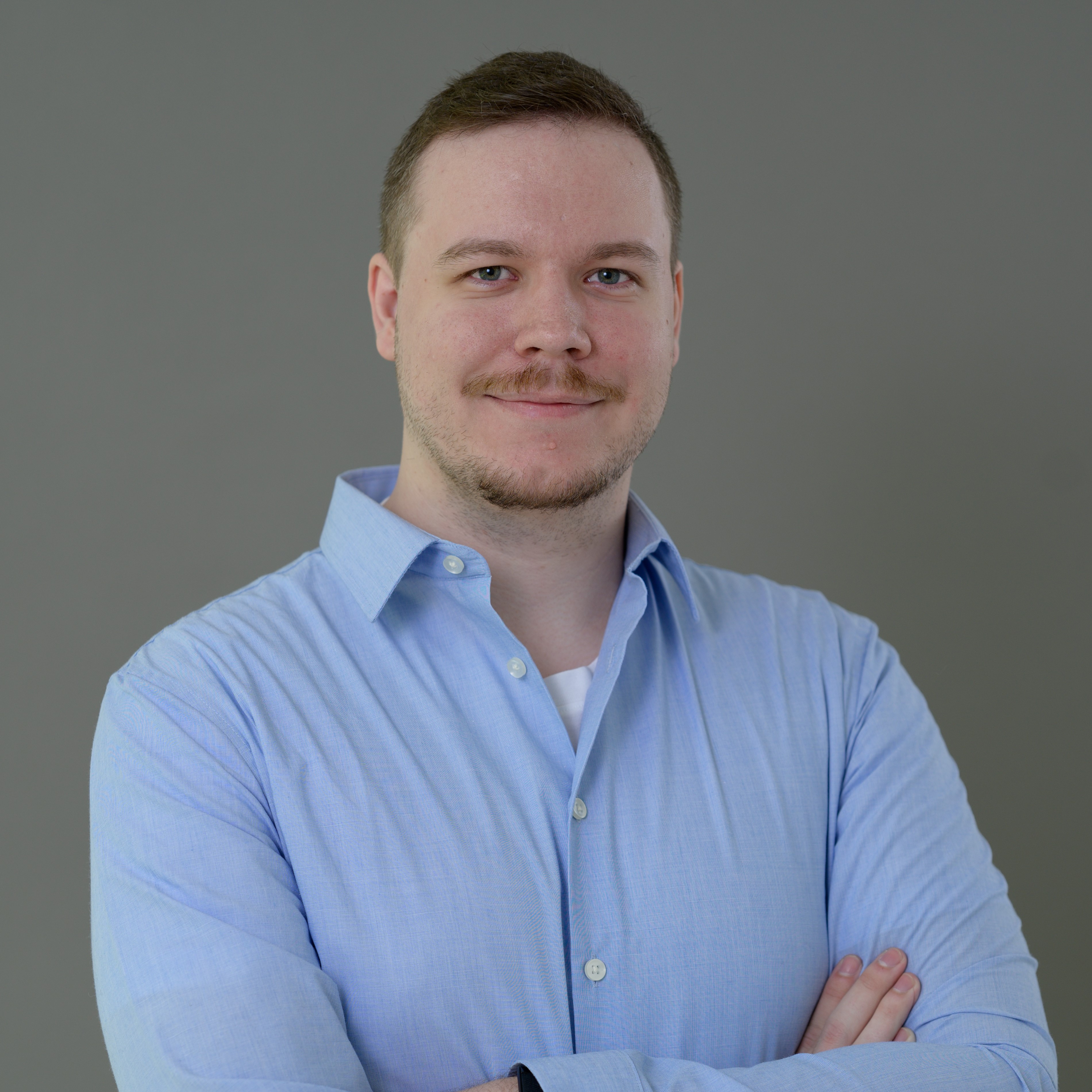
I am an enthusiastic robotics engineer with a love for mobile robots and autonomous vehicles. With the combination of knowledge and eager to learn, I strive to push the boundaries of automation and robotics.

Ich bin ein begeisterter Robotik Ingenieur mit einer Vorliebe für mobile Roboter und autonome Fahrzeuge. Mit der Kombination aus Wissen und Lernbegierde strebe ich danach, die Grenzen der Automatisierung und Robotik zu verschieben.
I'm Fynn, an enthusiastic robotics engineer with a fable for mobile robotics, driverless vehicles and bionics. Throughout the years I have gained experience in several areas of industrial and mobile robotics. My skills lie in different navigation and SLAM methods for mobile robots and ROS. I have also gained a lot of experience researching in kinematics of robotic manipulators. With my bachelor's thesis and master's thesis I have focused my research on systems like prostheses, orthoses or bionic robots.
I graduated in 2022 with merit and a Bachelor's degree in Mechatronics/Robotics and in 2024 with distinction and a Master's degree in Robotics Engineering at the University of Applied Sciences Technikum Wien. In 2023, I had the privilege of contributing to the academic discourse by publishing a paper at ARW 2023 (Austrian Robotics Workshop 2023) as part of a project with a colleague. During my journey, I've also had the opportunity to immerse myself in the exciting realm of autonomous vehicles. I've been an integral part of the Formula Student team TU Wien Racing from 2021 to 2023, where I've gained hands-on experience with developing a driverless car.
When I'm not working on projects or dabble in robotics, you can probably find me dancing on West Coast Swing socials.
Ich bin Fynn, ein begeisterter Robotik-Ingenieur mit einem Faible für mobile Robotik, selbstfahrende Fahrzeuge und Bionik. Im Laufe der Jahre habe ich Erfahrungen in verschiedenen Bereichen der industriellen und mobilen Robotik sammeln dürfen. Meine Fähigkeiten liegen in verschiedenen Navigations- und SLAM-Methoden für mobile Roboter und ROS. Ebenso habe ich während der Erforschung der Kinematik von Manipulatoren viel Erfahrung gesammelt. In meiner Bachelorarbeit und Masterarbeit habe ich mich zusätzlich mit Systemen wie Prothesen, Orthesen oder bionischen Robotern beschäftigt.
Ich schloss mein Studium 2022 mit gutem Erfolg im Bachelor Mechatronik/Robotik, und 2024 mit ausgezeichnetem Erfolg im Master Robotics Engineering an der Fachhochschule Technikum Wien ab. Im Jahr 2023 hatte ich das Privileg, einen Beitrag zum akademischen Diskurs zu leisten, indem ich im Rahmen eines Projekts mit einem Kollegen ein Paper beim ARW 2023 (Austrian Robotics Workshop 2023) publizierte. Während meiner Reise hatte ich auch die Gelegenheit, in die spannende Welt autonomer Fahrzeuge einzutauchen. Von 2021 bis 2023 war ich fester Bestandteil des Formula-Student-Teams TU Wien Racing und habe dort praktische Erfahrungen bei der Entwicklung eines autonomen Autos gesammelt.
Wenn ich nicht gerade an Projekten arbeite oder mich mit Robotik beschäftige, trifft man mich wahrscheinlich beim Tanzen auf West Coast Swing Socials.
This section presents the publications which have been performed as part of my study at the UAS Technikum Wien.
Inverse kinematics for robots with high degrees of freedom require numerical approaches to approximate optimal solutions in the joint space for a desired endeffector pose. Moreover, computation of the Jacobian matrix is dependent on the configurations design parameters. The use of a mani-fold representation allows to circumvent challenges that may arise when opting for a reduced geometric form. In this work the inverse kinematic problem is approached using an on-manifold optimization scheme based on the Levenberg-Marquardt algorithm, including a technique that can be used for auto-differentiation on arbitrary serial open chains. An open-source implementation based on the Matlab robotics-toolbox is provided and tested on industrial manipulators.
Dieser Abschnitt repräsentiert Forschungsarbeiten, welche ich während meines Studiums an der FH Technikum Wien publiziert habe.
Inverse kinematics for robots with high degrees of freedom require numerical approaches to approximate optimal solutions in the joint space for a desired endeffector pose. Moreover, computation of the Jacobian matrix is dependent on the configurations design parameters. The use of a mani-fold representation allows to circumvent challenges that may arise when opting for a reduced geometric form. In this work the inverse kinematic problem is approached using an on-manifold optimization scheme based on the Levenberg-Marquardt algorithm, including a technique that can be used for auto-differentiation on arbitrary serial open chains. An open-source implementation based on the Matlab robotics-toolbox is provided and tested on industrial manipulators.